-Unprecedented 430,000 Americans Opening New Businesses Every Month, up 50% from 2019-
-Record Number of Loans Given to Black, Latino and Female Entrepreneurs
Entrepreneurship has always been at the center of the US economy but is now growing at an unprecedented rate. In 2024, 430,000 entrepreneurs opened new businesses every month, a level that surged 50 percent since 2019, according to the US Treasury Department.
During the pandemic, people learned how effectively they can work from home – and they enjoyed the flexibility. As we reach the midway point of the decade, AI has democratized technology, giving everyday Americans the ability to follow their dreams with nothing more than an idea, laptop and WiFi signal.
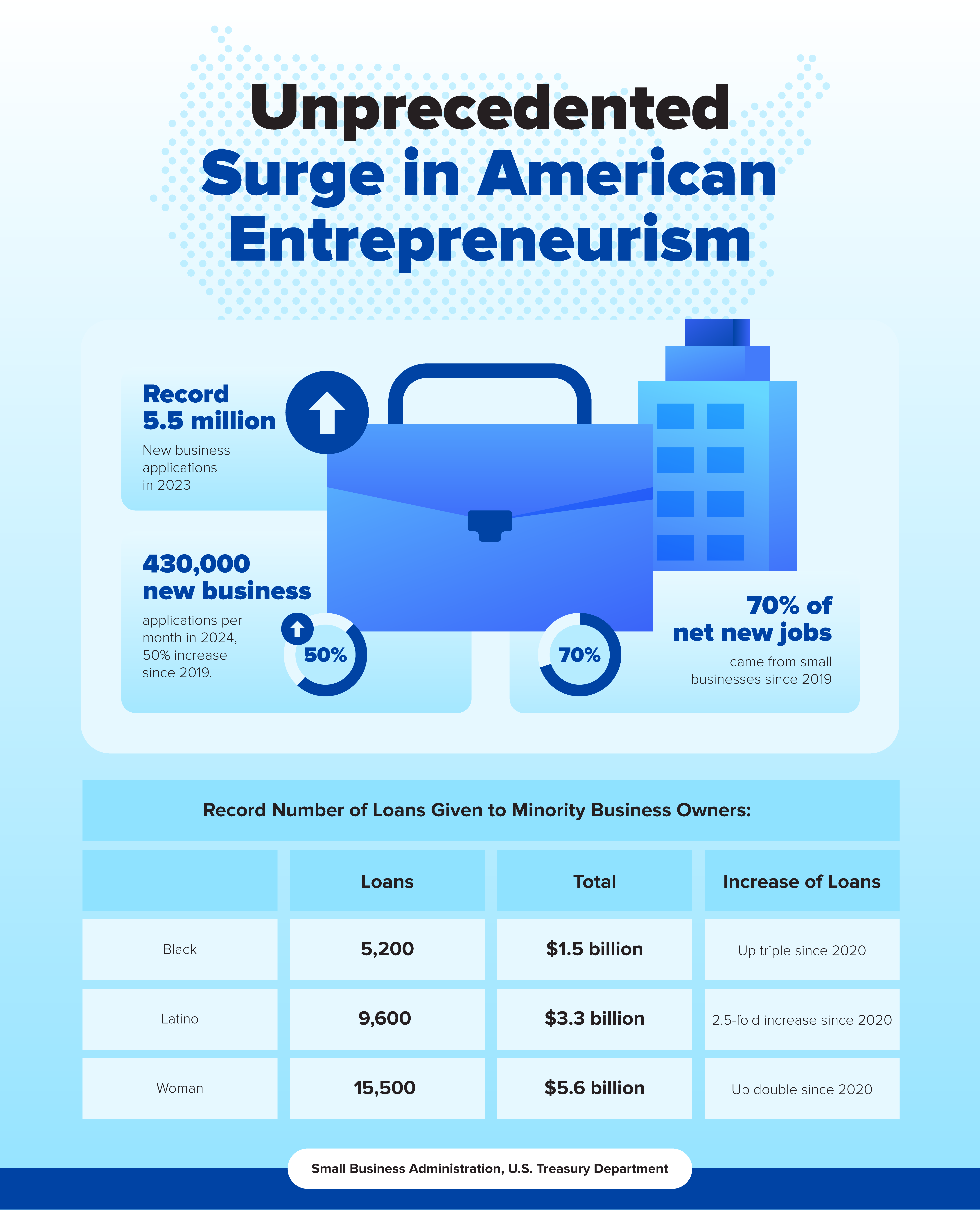
Just five years ago, go-getters who wanted high paying jobs had to congregate in expensive business hubs such as New York City and San Francisco. Today, the entrepreneurial landscape is far less geographically concentrated with many people choosing to live in places with lower taxes and a better cost of living.
This trend will continue in 2025 after the government launched Tech Hubs in 32 states last year offering financial incentives for businesses to open all across the nation.
The face of US business is also more diverse than ever, with a record number of small business loans given to Latinos, Black Americans and women, according to the SBA FY24 Capital Impact Report.
In the midst of these historic changes – and considering most new businesses fail – deciding where to plant your flag has more importance than ever before and there are many factors to consider.
Determining the Best & Worst States for Entrepreneurs in 2025:
SimplifyLLC analyzed the most recent federal data across the following six categories:
- Job creation
- Consumer spending
- Inflation
- Business growth
- Corporate taxes
- Educated worker migration.
The complete methodology with links to the source data is at the bottom.
However, these self-starters are also grappling with economic uncertainty, funding disparities, and regulatory hurdles that mean not every state is created equal when it comes to business opportunities. SimplifyLLC analyzed the most recent federal data across six metrics to identify the best and worst states for entrepreneurs in 2025, including job creation, consumer spending, inflation, business growth, corporate taxes, and whether educated workers are more likely to move in or out of the state.
We also used our 2024 rankings to measure how the climate for entrepreneurs has changed over the past year.
Key Findings
- Washington Is the Best State for Entrepreneurs. Its No. 1 spot was driven by strong business growth (110.8% increase in the year ending November 2024) and a lack of corporate income taxes, making it an appealing state to set up shop.
- Alabama Is the Worst State for Entrepreneurs. Consumer spending was down by 0.6% year-over-year, inflation has hit hard and the state is struggling to attract educated workers.
- Major Changes Between 2024 and 2025. New England states climbed in the rankings this year (Vermont, New Hampshire, Rhode Island, Massachusetts, Connecticut and Maine) largely because of increases in job creation and consumer spending growth. On the other side of the spectrum, four states – Kansas, Pennsylvania, Delaware and Utah – fell more than 30 places after scoring poorly across the board.
- Record Number of Small Business Loans for Minorities: Loans to black-owned businesses tripled since 2020, while loans to Latinos and Women doubled during that period.
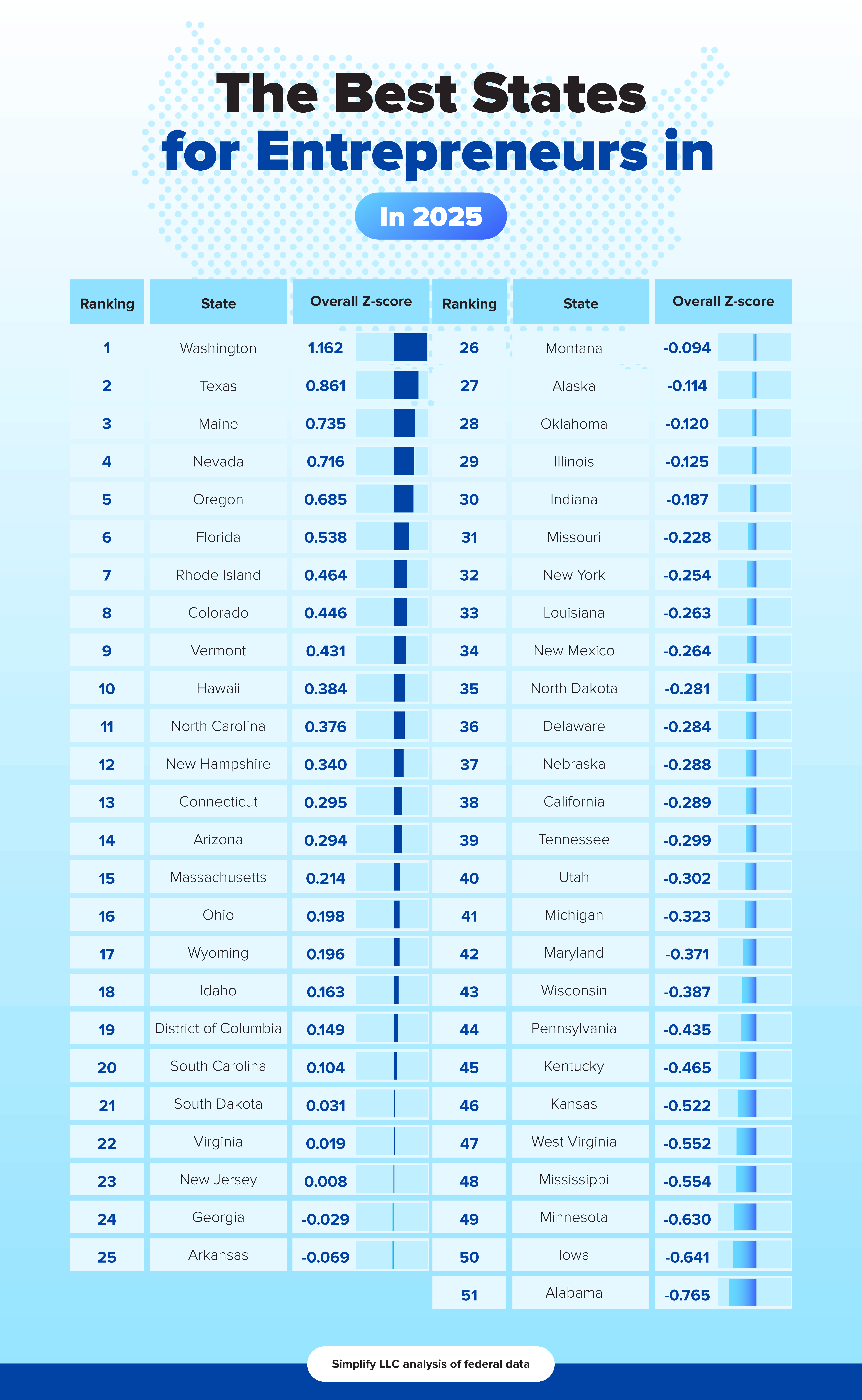
Best States
Washington – home to thriving tech tub Seattle – rose from No. 8 last year to become the best state for entrepreneurs in 2025. It had the most business growth in the US (110.8% year-over-year), relatively lower levels of inflation in the region (20% compared to January 2021) and nonexistent corporate income taxes.
Texas may have dropped from first prize this year, but it still landed at No. 2 due to its high job creation rate (17.3), influx of educated workers (62,000 more educated adults moved into the state than moved out in 2023) and, like Washington, a lack of corporate income taxes.
Rounding out the top five were Maine, Nevada and Oregon. No. 3 Maine saw more consumer spending growth than anywhere else (7.3% increase between 2022 and 2023), while No. 4 Nevada had the highest job creation rate in the US (21.1) and No. 5 Oregon had a particularly high rate of new business growth (57.4%)
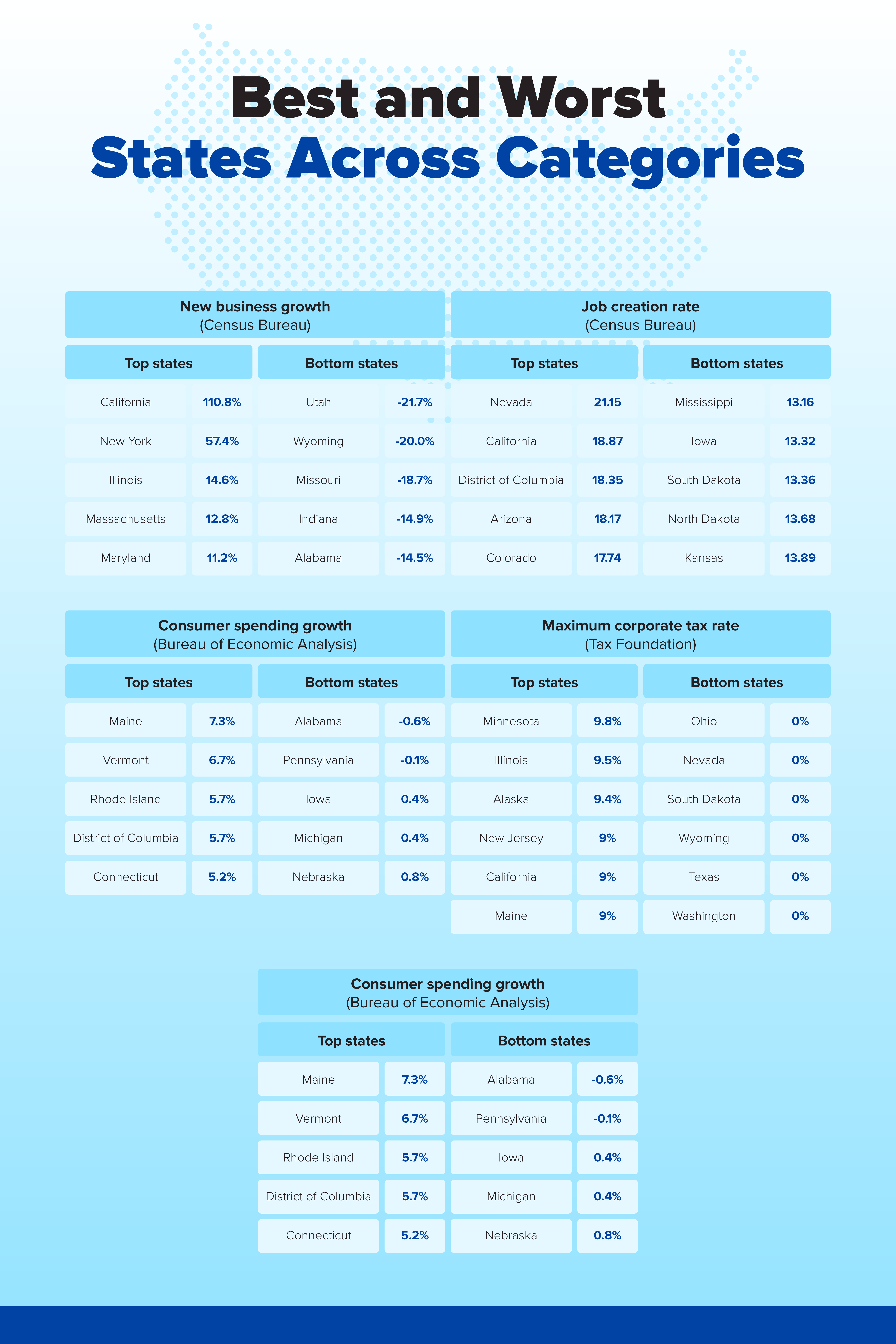
Worst States
Alabama took last place, making it the worst place for entrepreneurs in 2025. It had one of the biggest declines in new business openings (down 14.5%), and was one of only two states to see declines in consumer spending growth (-0.6%) year over year.
Alabama has also struggled to attract a professional workforce, with about 3,000 more educated adults moving into the state than out of it in 2023. The region has a high inflation rate, with prices up 22% relative to early 2021 prices.
Iowa wasn't much better, taking the No. 50 slot. The Hawkeye State's low score was driven by its above-average maximum corporate income tax rate (7.1%) and stagnant consumer spending growth (0.4% year over year).
Minnesota, Mississippi, and West Virginia also landed among the bottom five. New business openings have fallen by 11.3% in No. 49 Minnesota, while consumer spending growth and job creation was subpar in No. 48 Mississippi and No. 47 West Virginia. Inflation was high across the board, at either 21% or 22% in each region.
What Changed From 2024 to 2025?
2024 was a mixed bag in terms of new business launches, with just 17 states reporting an increase in business applications year over year. However, only nine states saw an improvement from their 2023 growth levels, and only one state – Alaska – managed to reverse a negative trend, with a 3% decline in new business growth in 2023 but an increase of 2.7% in 2024.
Even so, job creation stayed on a positive trajectory across the US, with all states reporting improvements over the year before. Hawaii, Nevada, and Washington, D.C., saw the biggest percentage point increases year-over-year, while growth was slowest in Delaware, Utah and Kansas.
When it comes to costs, inflation has risen fastest in the Southeast, including Alabama, Kentucky, Tennessee, and Mississippi. Relative to 2021 prices, everyday goods were up 22% in November 2024 – compared with 17.6% a year earlier, making it the biggest yearly increase of any region in the country. 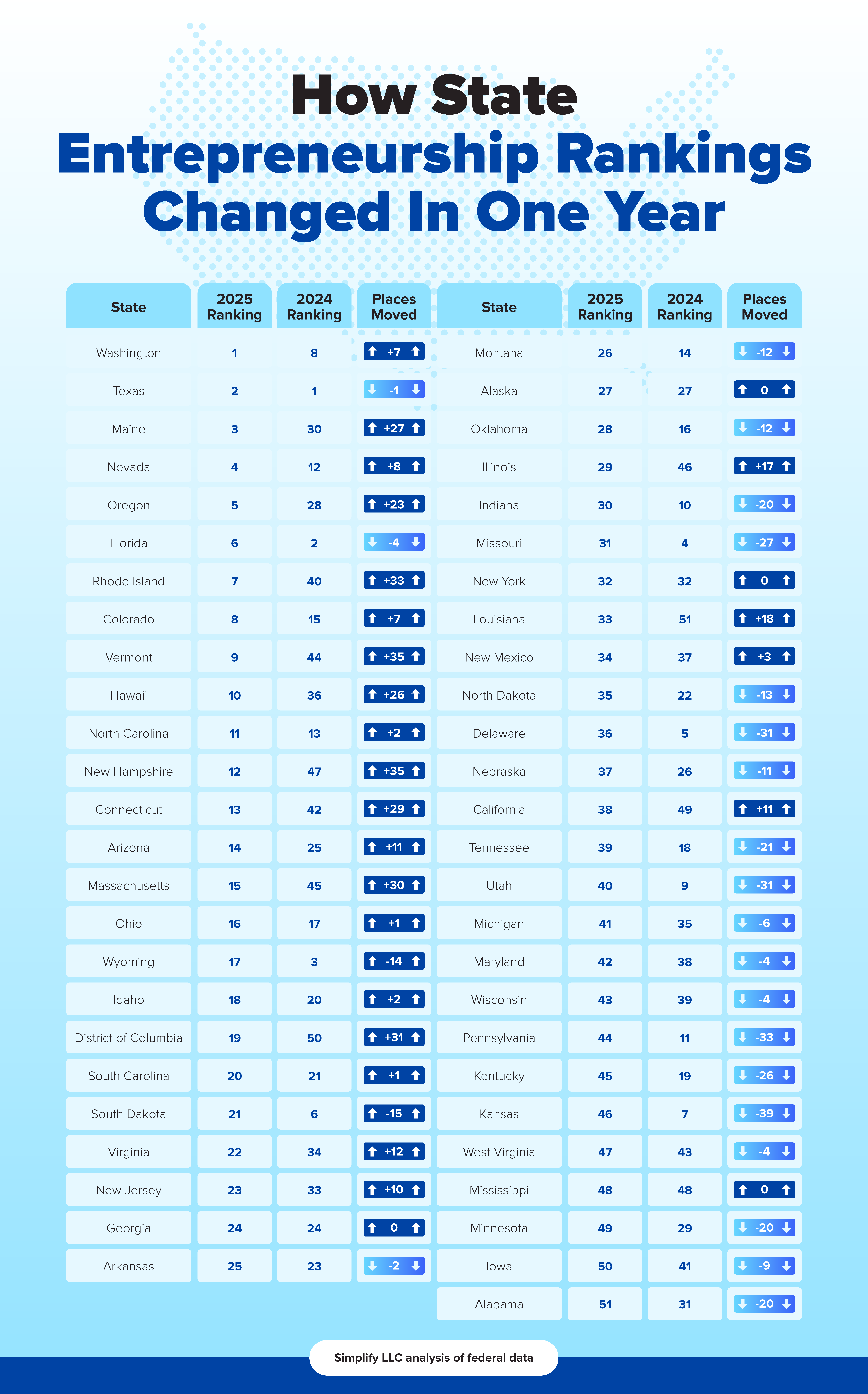
Shifting labor force dynamics were also key. While Florida still attracts more educated workers than any other state, the momentum has slowed down, and the Sunshine State brought in 68,050 fewer educated adults in 2023 than the year before.
Arizona and Connecticut saw the next-largest declines, though migration of educated workers was still net-positive in both states.
Meanwhile, net migration is rebounding in both New York and California, meaning they are losing fewer educated workers than they did in 2022. Even so, a combined 201,000 educated adults fled those two states last year.
The Best Entrepreneurs in America and 5 Common Traits That Made Them Successful
In addition to picking a location that gives you the best chance to succeed in 2025, there are also certain traits that all successful entrepreneurs must have regardless of where they operate. We decided to look at the richest people in America to see what they have in common.
Did you know that according to Forbes 2024 rankings of the 400 richest Americans, nine of the 10 wealthiest are self-made entrepreneurs. Tesla's Elon Musk, Amazon's Jeff Bezos, Meta's Mark Zuckerberg, Oracle's Larry Ellison, Berkshire Hathaway's Warren Buffett, Alphabet's Larry Page and Sergey Brin, Microsoft's Bill Gates and Bloomberg's Michael Bloomberg.
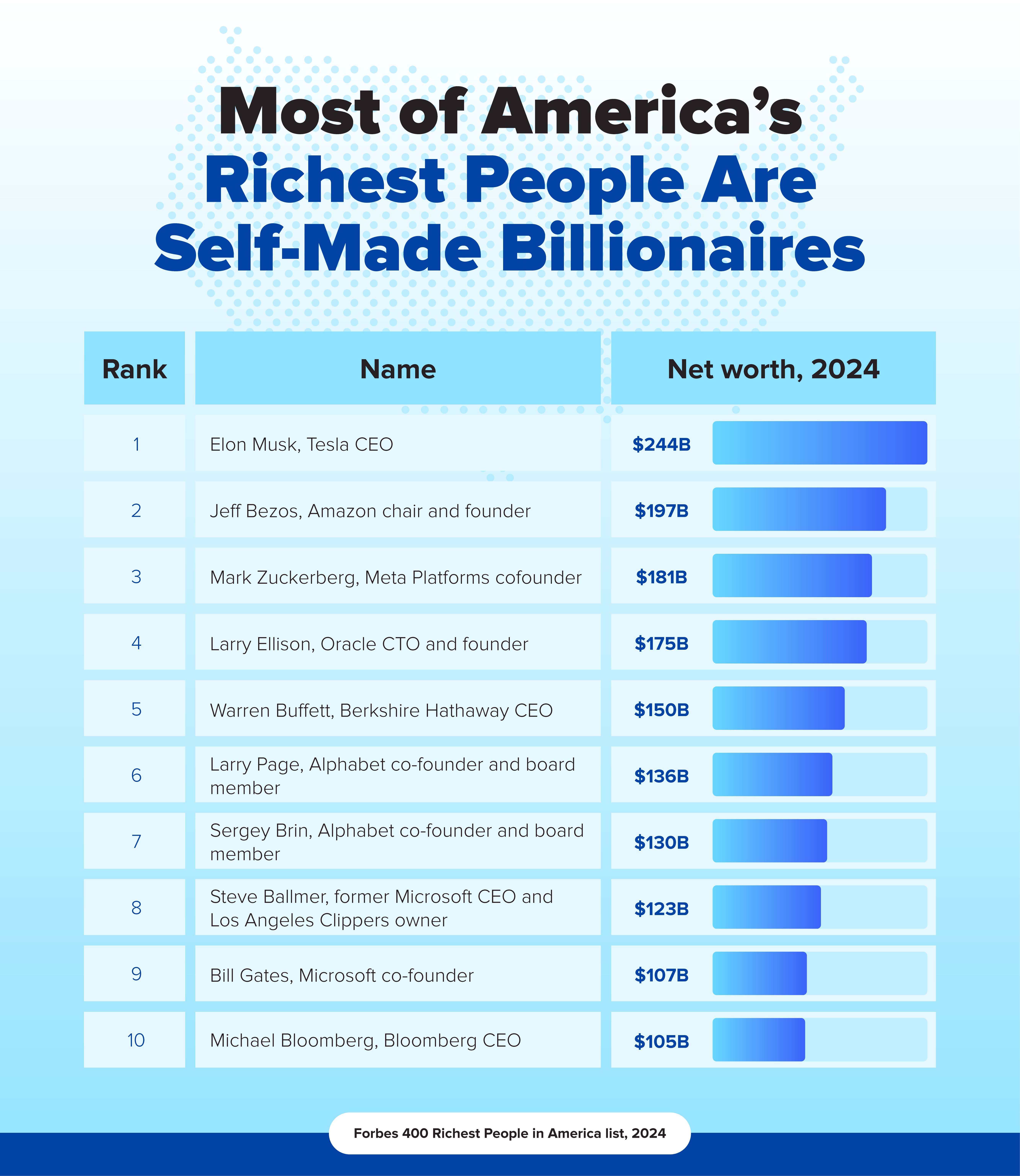
After reviewing their path to success, here are 5 traits all these visionary’s share.
- Visionary Thinking: These entrepreneurs all share the ability to envision a future that others often can't see. They had groundbreaking ideas that disrupted entire industries—whether it was Musk's vision for electric vehicles, Bezos's e-commerce empire, or Zuckerberg's plan for connecting people globally through social media. Their capacity to imagine what the future could look like and their ability to act on that vision set them apart.
- Resilience and Persistence: Success for these individuals didn’t come easily. They all faced numerous failures, setbacks, and moments of doubt, but what sets them apart is their resilience. Whether it was Amazon’s early years of profitability struggles or Musk’s numerous near-bankruptcies with Tesla, they kept going, constantly iterating on their ideas until they succeeded.
- Risk-Taking: Each of these entrepreneurs has shown a willingness to take significant risks in pursuit of their goals. For instance, Bezos risked everything on Amazon during the early dot-com crash, Musk invested his personal fortune to keep Tesla afloat, and Gates dropped out of Harvard to pursue his software ambitions. These risks were calculated, but they required the courage to defy conventional wisdom.
- Relentless Focus on Innovation: These leaders are all committed to innovation and have a drive to continually improve and disrupt. Gates and Allen’s focus on software, Page and Brin’s dedication to transforming information accessibility through Google, or Bloomberg’s drive to reshape financial data with his terminal—all exemplify their constant push for progress and technological innovation.
- Long-Term Thinking and Patience: All these entrepreneurs have exhibited a remarkable ability to focus on long-term goals, even in the face of short-term difficulties. Buffett’s approach to value investing, Musk’s commitment to sustainable energy, and Bezos’s initial focus on growing Amazon over short-term profits demonstrate their patience and focus on building lasting, transformative businesses.
Top 10 Sectors for New Business Applications
Another critical component to being successful is to create a company that fills a need and is in demand. To do that, it is helpful to examine which sectors are seeing growth and momentum.
According to the most recent annual data from the U.S. Census Bureau's Business Formation Statistics found these were the 10 sectors with the most new business applications in 2023. These sectors reflect current entrepreneurial trends in the U.S. and it would be important to research how these industries are performing in 2025.
- Retail Trade: Encompasses businesses selling goods directly to consumers, including e-commerce and brick-and-mortar stores.
- Professional, Scientific, and Technical Services: Includes legal services, accounting, consulting, and specialized design services.
- Construction: Covers residential and non-residential building construction, as well as specialty trade contractors.
- Health Care and Social Assistance: Comprises medical practices, outpatient care centers, and child day care services.
- Accommodation and Food Services: Encompasses hotels, restaurants, and other food service establishments.
- Administrative and Support Services: Includes employment services, business support services, and travel arrangement services.
- Transportation and Warehousing: Covers freight trucking, warehousing, and storage services.
- Real Estate and Rental and Leasing: Includes real estate agencies, property management, and equipment leasing services.
- Educational Services: Comprises tutoring, language schools, and other educational support services.
- Arts, Entertainment, and Recreation: Encompasses performing arts companies, fitness centers, and recreational facilities.
Conclusion
While the U.S. is defined by its iconic business hubs from Silicon Valley to New York City and everywhere in between, new workplace, technology and economic trends are reshaping American entrepreneurship and allowing unexpected new hotspots to emerge. For new startup founders and seasoned executives alike, understanding how these trends affect the business landscape in different parts of the country is crucial when deciding where to launch, expand or relocate your firm.
Methodology
We used the most recent data for six metrics to determine the best and worst states to start a business. We used a Z-score distribution to scale each metric relative to the mean across all 50 states and Washington, D.C., and capped outliers at 3. We multiplied these scores by -1 if it was better to have a lower rate, including for corporate tax rates and inflation. A state's overall ranking was calculated using its average Z-score across the six metrics. Here's a closer look at the metrics we used:
- New business growth rate, Nov. 2023-2024 (Census Bureau)
- Job creation rate, 2022 (Census Bureau)
- Consumer spending growth, 2022-2023 (Bureau of Economic Analysis)
- Maximum corporate tax rate, 2024 (Tax Foundation)
- Regional inflation as of Oct. 2024, relative to Jan. 2021 prices (U.S. Senate)
- Educated worker mobility: Net migration in 2023 among workers with at least some college, an associate's, bachelor's or graduate degree (Census Bureau)